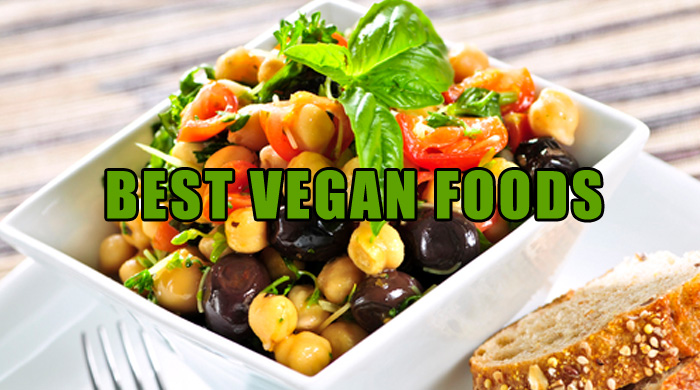Best Vegan Foods

The best vegan foods are non-hybrid alkaline whole plant foods. When it comes to supporting health, eating mostly raw non-hybrid alkaline whole plant foods will best support health and homeostasis.
Hybrid plants and the foods they provide are made by combining two or more plants to make a new species of the plant. This changes the original genetic and biological composition of the plants and reduces the new plant’s chemical affinity with the body.
Changing the genetic and biological composition of the plant often results in introducing compounds that cause problems or byproducts during digestion that compromise the health of the immune system in the digestive tract.
This is of great concern because 80% of the immune system is in the digestive tract.
Eating should be about “eating to live” instead of “living to eat.” When we approach eating from the perspective of “eating to live” we then make decisions to eat foods that best support a healthy body and life. The non-hybrid alkaline vegan foods on this nutritional guide support a healthy body and life and are protective against disease.
In contrast processed meats have been labeled as carcinogenic by the World Health Organization and red meat was labeled as “probably carcinogenic to humans,” and both are damaging to health.
The best vegan foods would include a wide assortment of raw non-hybrid alkaline vegetables and fruits, complimented with nuts, seeds, legumes, and whole grains.
Cooked plants foods like quinoa, spelt, or kamut grains help to round out the consumption of raw foods and satisfy the need to eat something hot.
Best Vegan Foods
The consumption of non-hybrid alkaline raw fruits and vegetables should be the focus of eating to live. These foods are the easiest and quickest to prepare and are loaded with vitamins, minerals, phytonutrients, and quick burning carbohydrate energy to support and energetic body.
These foods are full of fiber to clean and protect your digestive, and to feed the immune system in the digestive tract. 80% of the body’s immune system is in the flora in the digestive tract and the heavily concentrated fiber in fruits and vegetables is the flora’s food.
The flora digests the fiber and makes the short-chain fatty acid butyrate which feeds the cells lining the colon. Feeding the colon fiber fights inflammation, cancer, and auto-immune diseases in the colon.
Blended Vegetable Juices and Fruit Smoothies
Our food was intended to be our medicine. Plants are nutrient dense and can supply all the nutrients we need to support health, without the use of synthetic vitamins or mineral supplements.
Eating natural diets high in fruits and vegetables, and nuts, seeds, legumes, and whole grains natural saturate the body with the nutrients it needs to support and maintain homeostasis.
The invention of the blender makes it even easier to consume more fruits and vegetables to super saturate the body with needed nutrients. Some people make the argument for eating cooked foods because the cell walls of raw food are completely intact and hold on to its nutrients more during digestion.
If foods are not thoroughly chewed to break down the cell walls some of the plant’s nutrients may not be absorbed into the blood stream.
Blending fruits and vegetables into juices and smoothies makes the nutrients more bioavailable, and also allows you to consume more fruits and vegetables than you would normally consume if you ate them whole.
Cleansing Foods
Vegetables are extremely good cleansing foods that are high in fiber and are also high in micronutrients, but less concentrated with macronutrients than fruits are. Micronutrients are vitamins, minerals, and phytonutrients. Vitamins and minerals are used by the body to perform metabolic processes that keep the organs healthy and functioning properly.
Phytonutrients are compounds found in plants that plants use to protect themselves form bugs and disease in the environment. The body uses their phytonutrients to help bolster its immune system.
Natural alkaline life supporting vegetables include:
| Amaranth greens (Callaloo) Avocado Bell Peppers Chayote (Mexican Squash) Cucumber Dandelion greens Garbanzo beans (Chickpeas) Green Banana Izote (cactus leaf) |
Kale Lettuce (all, except Iceberg) Mushrooms (all, except Shitake) Mustard greens Nopales Okra Olives Onions Purslane (Verdolaga) |
Poke salad Sea Vegetables (wakame/dulse/arame/hijiki/nori) Squash Tomato (Cherry and Plum only) Tomatillo Turnip greens Watercress Zucchini |
Energy Foods
Fruits are concentrated with macronutrients in the form of carbohydrates, and are less concentrated in micronutrients than vegetables are.
Carbohydrates from fruits are our natural source of energy. They are quick burning, light on the digestive system, and quickly support muscle function.
Fresh fruits and not canned fruits are recommended because canned fruits are processed and contain cancer causing additives and preservatives.
Natural alkaline life supporting fruits include:
| Apples Bananas Berries Cantaloupe Cherries Currants Dates |
Figs Grapes -seeded Key Limes Mango Melons -seeded Oranges Papayas Peaches |
Plums Prickly Pear Prunes Raisins -seeded Soft Jelly Coconuts Soursops Tamarind |
Milk
It is better to make your own milk than to buy it to make sure you are drinking pure nut or seed milk. If you are looking to replace cows milk for protein and calcium it is not necessary. A well-rounded plant-based diet naturally supplies the protein and calcium the body needs.
Hemp seed milk, Coconut milk, Walnut milk, Almond milk
Protein
A well-rounded plant-based diet easily supplies all the protein needed to support and energetic body. The body only needs around 10% of its calories to come from protein and this is easily supplied with a mixture of fruits, vegetables, nuts, seeds, legumes, and whole grains.
All plant foods contain protein, but the foods listed below are more concentrated with protein.
| Grains: Amaranth Fonio Kamut Quinoa Rye Spelt Tef Wild Rice |
Legumes: Garbanzo Beans (Chickpeas) |
Nut & Seeds: Brazil Nuts Hemp Seeds Pine Nuts Raw Sesame “Tahini” Butter Walnuts Almonds |







